Our Vision
Fibershed Sri Lanka envisions a regenerative and equitable future for the textile, fashion, and material industries rooted in the values of de-colonized, localized, and sustainable practices. We aim to foster a thriving local system of diverse natural fiber communities that strengthen regional economies and create lasting, eco-friendly production systems. By integrating scientifically vetted soil carbon-enhancing practices, we will produce climate-beneficial products that set a new standard in the industry.
We see a world where consumers are deeply connected to the origins of their materials, understanding and valuing the journey from soil to skin and a closed-loop system (Circular Economy). Our mission is to support and empower local communities in Sri Lanka by reviving traditional practices, advocating for local fibers and dyes, and ensuring fair labour systems. Through education and community engagement, we will transform the economic systems behind material production, minimizing waste, mitigating climate change, improving health, and contributing to racial and economic equity. Fibershed Sri Lanka is dedicated to creating a sustainable, circular economy that honors our heritage and supports future generations.
Our Mission
Fibreshed Sri Lanka is a non-profit organization that develops regional fiber systems that build ecosystem and community health. Our work expands opportunities to implement climate benefitting agriculture, rebuild regional manufacturing, and connect end-users to the source of our fiber through education. We transform the economic systems behind the production of material culture to mitigate climate change, improve health, and contribute to racial and economic equity. In this context, Fibershed Sri Lanka intends to once again support, empower, transform, and grow the local communities that are already existed in good old days and are engaged in local fiber supply chain in Sri Lanka. Necessary in the transition to a circular economy and sustainable future for the Sri Lankan textiles, fashion and material industries that sustain our lifestyle. It mainly focuses on improving, advocating, and promoting local fibers, local dyes, and local labour systems.
Our Objectives
- Cultivate Regional Fashion and Textile Economies (Local Fibers-Narural)
- Expand Climate Beneficial Agriculture (Sustainable Agriculture)
- Empower Education & Advocacy to the local craftsman and farmers (Local Dye and Local Labour)
- To create a closed-loop system where products, materials, and resources are reused, recycled, and repurposed, thereby minimizing waste and environmental harm (Circular Economy)
Our Values
Fibershed is a concept that encompasses several values related to sustainable and localized fiber production. As such Fibershed Sri Lanka has no exception from our broader concept. Here are some of the key values associated with Fibershed Sri Lanka initiatives:
- Circular Economy:The circular economy concept promotes sustainability and reduces environmental impact by rethinking traditional linear economic models, which involve the extraction of resources, production, consumption, and disposal. Instead, the circular economy aims to create a closed-loop system where products, materials, and resources are reused, recycled, and repurposed, thereby minimizing waste and environmental harm.
- Sustainability: Fibershed promotes sustainable practices in fiber production, processing, and distribution in Sri Lanka and connect them with international markets where applicable. This includes reducing the carbon footprint associated with natural fiber & dye production, minimizing waste, repurposing waste and promoting regenerative agricultural practices.
- Localism: Fibershed Sri Lanka emphasizes the importance of local economies and communities by encouraging the production and consumption of fibers within a defined geographic region. We started in North Central Province (Polonnaruwa) and our expansion is ongoing. This reduces the environmental impact of transportation and supports local farmers, artisans, and businesses.
- Transparency: Fibershed Sri Lanka promotes transparency in the supply chain, allowing consumers to understand where their textiles, fashion and material products (natural fiber) come from and how they are produced. This fosters trust between producers and consumers and encourages accountability in the industry. Our ultimate goal is to transform the entire supply chain into a blockchain and decentralised platform.
- Regenerative Agriculture: Fibershed Sri Lanka strictly advocates for agricultural practices that promote soil health, biodiversity, and ecosystem resilience in all of their agriculture projects. This includes practices such as cover cropping, rotational grazing, and agroforestry, which help to sequester carbon, reduce erosion, and enhance soil fertility.
- Community Building: Fibershed Sri Lanka initiatives often involve collaboration between farmers, artisans, designers, producers, and consumers. By fostering connections within local communities, fibershed projects support social cohesion and cultural exchange.
- Cultural Preservation: Fibershed Sri Lanka initiatives may also seek to preserve traditional fiber arts and cultural practices that are integral to local identities. This includes techniques such as spinning, weaving, dyeing, and knitting, which have been passed down through generations. Sri Lanka has a long and rich history of textile and fiber with several indigenous peoples providing rich cultural heritage and hereditary skills. Cotton spinning and weaving in particular dates back to 543 BC. This was proven by the story of Kuveni in Sri Lanka which tells us that handwoven textile weaving was largely a home or community-oriented industry.
- Global Collaboration and Local Empowerment : Fibershed Sri Lanka values the integration of global brands and advanced technologies to foster local empowerment. By establishing local franchises in partnership with international entities, we aim to bring cutting-edge innovations and sustainable practices to our communities. This approach not only enhances the quality and competitiveness of our local fiber systems but also ensures that the benefits of global advancements directly support and uplift our regional economies and local artisans. Through these strategic collaborations, we are committed to creating a thriving, equitable, and sustainable future for the Sri Lankan textile and fashion industries.
Overall, our values prioritize environmental stewardship, economic resilience, and community well-being in the production and consumption of textiles.

